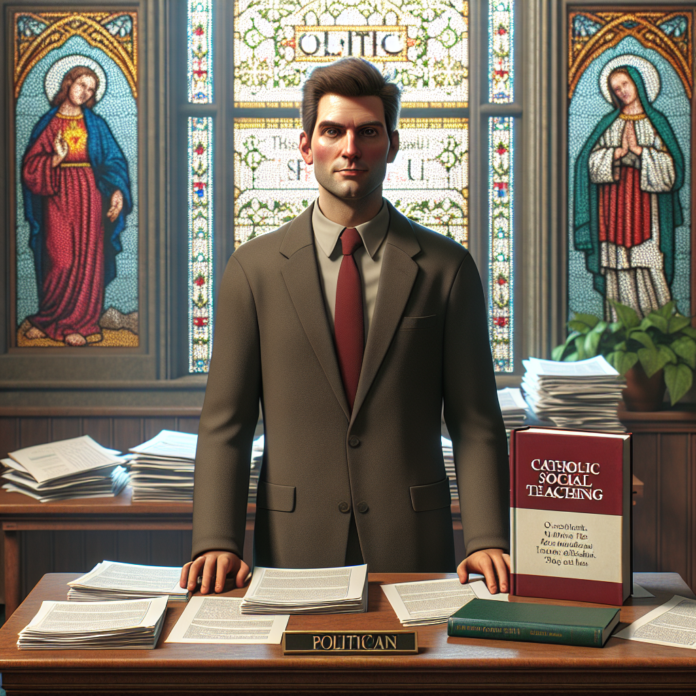Joseph R. Biden Jr., the 46th President of the United States, is not just a lifelong public servant but also a devout Roman Catholic. His image, shaped through decades of political service and personal tragedy, positions him uniquely at the intersection of faith and politics. As President, Biden draws heavily upon Catholic Social Teaching (CST), despite the myriad complexities and contrasts within contemporary Catholicism. His approach sheds new light on the relevance of CST in modern governance, offering a vision that starkly contrasts with traditionalist strains in the Church.
Catholic Social Teaching is a corpus of doctrine developed by the Catholic Church on matters of social justice, involving issues of poverty and wealth, economics, social organization and the role of the state. Since Pope Leo XIII’s watershed encyclical Rerum Novarum in 1891, the Church has progressively developed a robust framework for engaging with the world’s socioeconomic structures. Importantly, CST emphasises the dignity of every human being, the common good, solidarity, and subsidiarity. For Biden, these principles are not just theoretical constructs but guiding stars that shape his policies on healthcare, immigration, and climate change.
Biden’s commitment to CST is most evidently showcased in his healthcare agenda. The Affordable Care Act (ACA), often colloquially known as "Obamacare," underscores the principle of human dignity. Access to healthcare is framed as a fundamental human right, not a privilege. This stance is further fortified by Pope Francis’s repeated emphasis on universal healthcare as a moral imperative. Biden’s relentless defense of the ACA, despite fierce opposition from traditional conservative factions, underscores a CST-infused vision that prioritizes human needs over market-driven interests.
The President’s immigration policies reflect yet another facet of CST: the principle of solidarity and preferential option for the poor. In stark contrast to the harsh, exclusionary rhetoric and policies of the previous administration, Biden’s approach humanizes immigrants, treating them as individuals with inherent dignity. His efforts to reform a broken immigration system, provide pathways to citizenship for Dreamers, and ensure humane treatment of asylum seekers resonate deeply with Pope Francis’s calls to "welcome, protect, promote, and integrate" migrants and refugees. Here again, Biden’s policies stand in stark opposition to traditionalist views that prioritize national borders over global brotherhood.
Perhaps one of the most compelling areas where Biden’s presidency and CST converge is in tackling climate change. The President’s alignment with the Paris Agreement and his ambitious climate agenda echo the sentiments expressed in Pope Francis’s encyclical Laudato Si’, which passionately argues for the care of our common home. CST has long emphasized stewardship of the Earth, promoting ecological responsibility and sustainable development. By framing climate change as both an environmental and a social justice issue, Biden aligns with a CST perspective that argues for intergenerational justice and the protection of the planet’s most vulnerable populations.
However, not all Catholics embrace Biden’s interpretation of CST. Traditionalists, especially those attracted to the Latin Mass and conservative ideologies, often challenge his positions on issues like abortion and same-sex marriage, arguing that these stances contradict fundamental Church teachings. Yet, it is crucial to note that CST is not a monolith but a dynamic and evolving dialogue that adapts to contemporary challenges. While traditionalist factions highlight doctrinal purity, Biden’s approach leans into the Church’s evolving understanding of social issues under the influence of modern papal teachings, especially those of Pope Francis.
Pope Francis, often seen as a beacon of progressive values within the Catholic Church, has subtly supported an inclusive and dialogical approach to contentious social issues. His pontificate prioritizes mercy, accompaniment, and pastoral care over rigid adherence to doctrinal enforcement. This pastoral focus complements Biden’s vision, fostering a faith that engages with the world as it is, not as some might wish it to be. Biden, in his public expressions of faith and policy choices, seems to channel this vision, presenting a more compassionate and inclusive Catholicism.
Traditionalist opposition to this vision is palpable, particularly in the discourse surrounding the Latin Mass. Often seen as a bastion of conservative values, the Latin Mass community’s resistance to change can symbolically represent a broader resistance to the inclusive and progressive agenda both Biden and Pope Francis advocate. While reverence and tradition are essential aspects of any faith, the challenge lies in balancing them with a dynamic understanding that addresses contemporary societal complexities. Thus, Biden’s progressive policies, inspired by CST, engage with these complexities head-on, albeit not without controversy.
In the final analysis, Joe Biden’s presidency offers a profound example of how Catholic Social Teaching can inform and shape public policy in the 21st century. His alignment with CST principles illuminates a path that emphasizes human dignity, solidarity, care for creation, and an overarching commitment to the common good. This vision, while facing significant traditionalist opposition, resonates strongly with the progressive values espoused by Pope Francis, demonstrating that faith, far from being a static relic of the past, can be a living, breathing force for justice and compassion in the modern world. Biden, as both a leader and a Catholic, embodies this dynamic vision, inviting us all to consider how our beliefs shape our actions and policies for the betterment of society.
